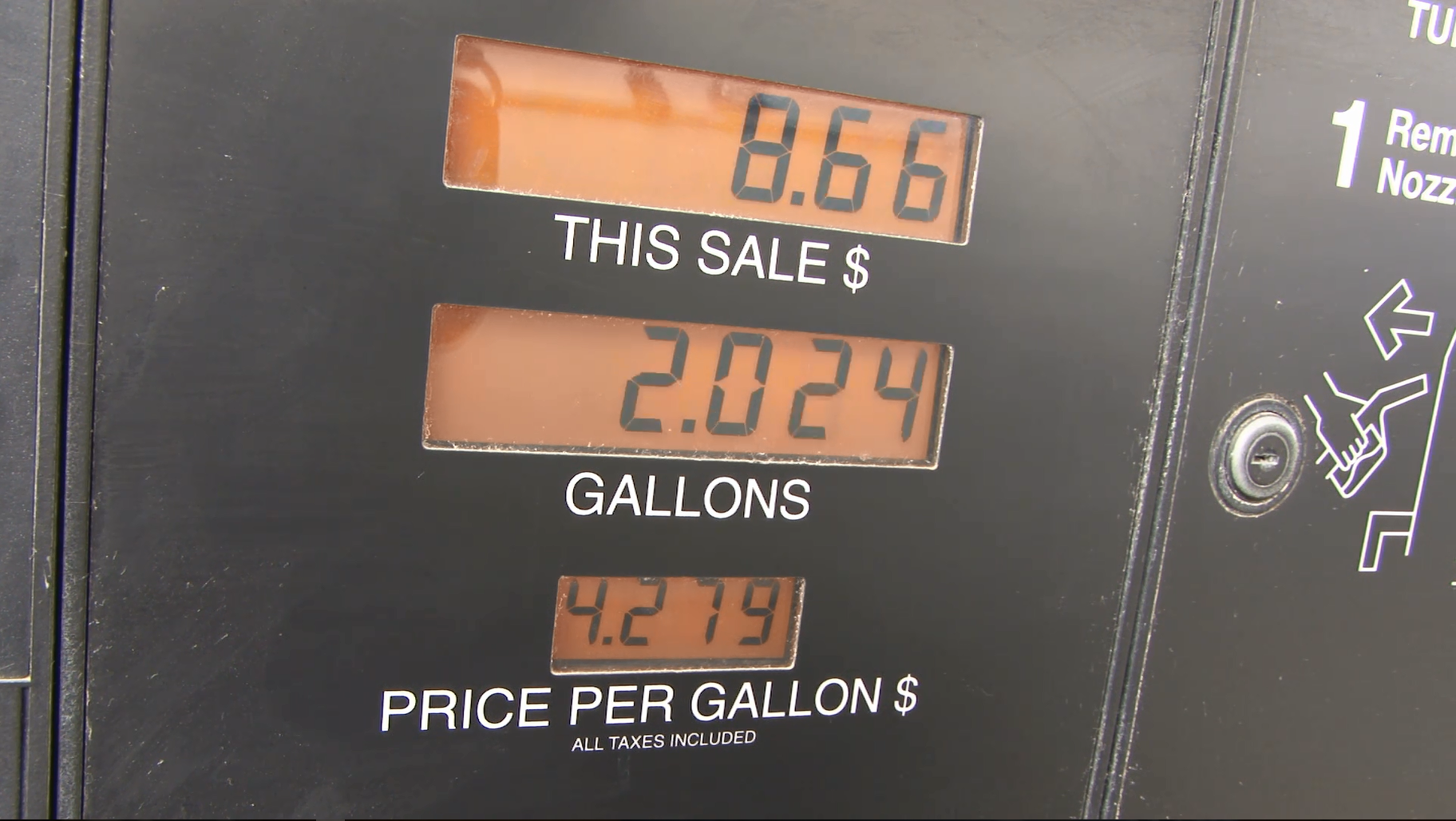If your business involves running a fleet of vehicles, fuel could be among your largest expenses. Not only that, but it can be one of the most difficult expenses to predict and control, as well. Depending on your business sector you may have all your vehicles out on one day and then only half out for the rest of the week.
Quick Links:
Understanding Your Current Fuel Costs

There are two methods for measuring your fleet’s current fuel costs: automated with telematics technology or manually with receipts and spreadsheets. The first method of utilizing GPS tracking technology can save you tremendous time and money, plus you’ll get valuable insight into your fleet operations.
On the other hand, measuring your fleet’s fuel use by hand necessitates the following:
- Choosing a measurement, like miles per gallon
- Implementing this measurement across the entire fleet and aligning your drivers to this effort
- Communicating results and performance, setting improvement goals, and outlining a strategy to achieve these goals
Even if you only have a couple of vehicles in your fleet, this process can feel overwhelming when it comes to mapping out your fleet’s fuel budget since there are so many variables that you simply can’t measure with mileage and receipts. Regardless of your methodology, there are some steps you can take to reduce your fleet’s fuel costs and make your operations more efficient.
12 Ways to Reduce Fleet Fuel Costs
If you’re trying to reduce fleet fuel costs but aren’t sure where to start, consider these 12 methods:
Monitor Speeding
It’s simple math: it takes more gas to drive fast. Speeding sucks up fuel quicker than driving at—or slightly below—the speed limit. To reduce fleet fuel costs, incorporate GPS tracking technology that monitors speeding and other dangerous driving behaviors, such as harsh braking.
Not only will tracking these habits help you save money on fuel costs, but it’ll also make your fleet drivers safer and reduce the chance of accidents from dangerous driving.
Track Engine Idling
Idling engines are a huge contributor to hefty fuel costs since your fleet vehicles get about 0 miles per gallon yet expend fuel when stuck in place. Some new fleet vehicle models have an automated start-stop feature that turns the engine off when the driver comes to a halt but re-engages the engine when the driver wants to move.
With GPS tracking technology, you can track engine idling to see where the driver is idling and for how long, which gives you insight into the state of your vehicle in relation to fuel consumption.
Improve Route Efficiency

Are your fleet drivers crisscrossing all over your community during their day? If your drivers frequently drive in full circles during their work, then it’s time to improve the efficiency of your fleet routes with GPS tracking technology.
Efficient routes mean your overall operations become streamlined and you can incorporate more customers since your drivers won’t be spending half their day driving back and forth. This also means you’ll save on fuel costs—and not accelerate maintenance schedules—by boosting the efficiency of your fleet routes.
Remove Unnecessary Weight from Vehicles
Do all of your fleet vehicles need a full set of tools or other pieces of heavy equipment for each trip? Your fleet vehicles won’t use extra fuel if they’re transporting lighter loads.
It might be a good idea to instill the habit of removing unnecessary items and cargo as needed in your fleet drivers so that your fleet vehicles aren’t being overworked. Removing unnecessary weight from vehicles also prevents undue wear and tear on your vehicles, and further extends their lifespan because of this.
Schedule Preventative and Regular Maintenance
This tip is a good rule of thumb no matter what your goals are for your fleet; whether you’re aiming to reduce fuel costs, extend the lifespan of your fleet vehicles, or ensure the safety of your drivers and community, scheduling preventative and regular maintenance is vital for your fleet operations!
In the context of saving money on fuel costs, maintenance will verify that your fleet vehicles are running as they should be and that you don’t have any leaks.
Sign Up for Fuel Cards
Your local gas station chain wants your fleet’s business. Many offer discounts by signing up for their fuel card program, which can save money in the short-term and long-run of your operations. Consider this approach to reduce the impact of fuel on your company’s overall fleet budget!
Limit Personal Use of Company Vehicles
Depending on your fleet vehicle usage policies, drivers may or may not be able to use the company’s car for personal use. Of course, personal usage will drive up fuel costs for your fleet operations since it entails your employees driving on your dime. Get together with your team to discuss what the personal use policy is for your fleet’s vehicles and evaluate the need to implement boundaries for employee usage.
Check the Tire Pressure

If you’ve ever ridden a bike with low tire pressure, then you know it takes a little—or a lot—more effort to get up to speed. The same applies to fleet vehicles! If one or more tires on your fleet vehicle are below the expected pressure, then that can cause the engine to work harder than it should have to.
In addition to checking tire pressure during scheduled maintenance servicings, incorporate a daily or weekly check for your fleet vehicles. This will also make sure that the tires aren’t punctured or otherwise close to blowing or growing flat.
Switch to Electric Vehicles (Or More Fuel-Efficient Models)
This would require more of an upfront cost due to the investment of purchasing electric or hybrid vehicles for your fleet, but it’ll guarantee significant savings in the fuel cost column of your fleet budget.
Fuel-efficient vehicles, whether hybrid or fully electric, will not only help reduce the cost of fuel for your fleet but also help reduce your company’s carbon footprint. This can be a great distinguishing factor for your business since customers will appreciate your operations “going green” for the planet.
Modify Your Vehicle to Be More Aerodynamic
Just as with a couple of aforementioned tips, like low tire pressure or unnecessary cargo, outside forces can significantly impact the amount of fuel it takes to power your vehicle. Wind drag greatly decreases fuel efficiency by making your vehicle work harder to get up to speed.
This can be addressed by small gestures such as keeping the windows rolled up or putting a cover on a pick-up truck bed or with more in-depth solutions like putting aerodynamic side mirrors on the vehicle.
Implement a Driver Training Course
Your fleet drivers are literally—and metaphorically—steering the cost of fuel for your fleet. So it makes sense to provide drivers with training regarding fuel-efficient habits and increase their overall awareness of fuel efficiency when on the road.
A training course might help them be more mindful about things like keeping gears low when accelerating, changing gears early, driving at slower speeds, and learning to read the road more effectively.
Leverage a Fleet Telematics Solution
As the saying goes, you don’t know what you don’t know. And if you’re managing fleet operations without a fleet telematics solution, then you’re missing out on a ton of data and insight regarding the status of your fleet, both in terms of individual vehicle performance and your operations as a whole.
GPS tracking systems can deliver specific information regarding your fleet vehicles, enabling you to monitor patterns of usage and keep up on maintenance schedules and empowering you to make informed decisions regarding your fleet and other assets.
Rastrac Can Help Optimize Your Fleet and Reduce Fuel Costs!
Since 1993, Rastrac has been a leader in the GPS tracking field to develop customized and comprehensive solutions for your fleet. With our trusted solutions, you can optimize your fleet’s performance and cut down on fuel costs! Plus, you’ll get unprecedented insight into your fleet vehicle operations to address points of improvement and make educated decisions for the future.
This, coupled with constantly fluctuating fuel prices, can make reducing your fuel expenses seem impossible. You may even feel as if the only answer is a completely new fleet! Rest assured, there are steps you can take to improve your existing fleet.
Like what you're reading? Subscribe to our blog.
Get our latest posts straight to your inbox.
Subscribe to Our Blog




